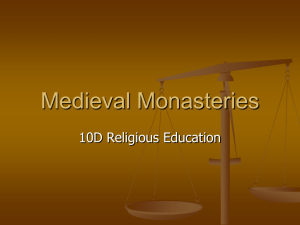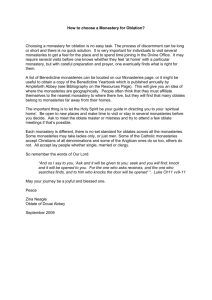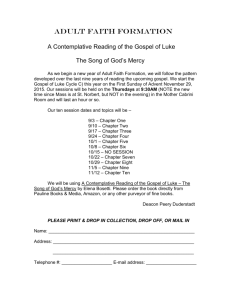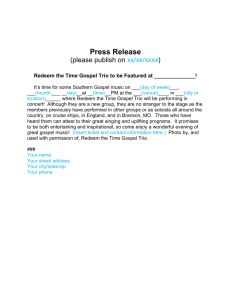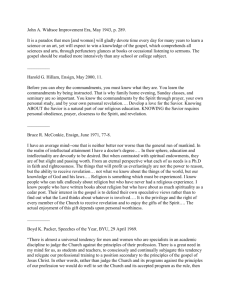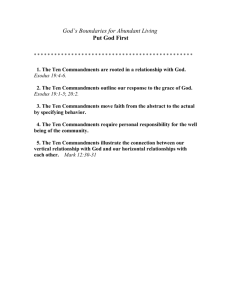Chapter 6 - Orthodoxyinfo.org
advertisement
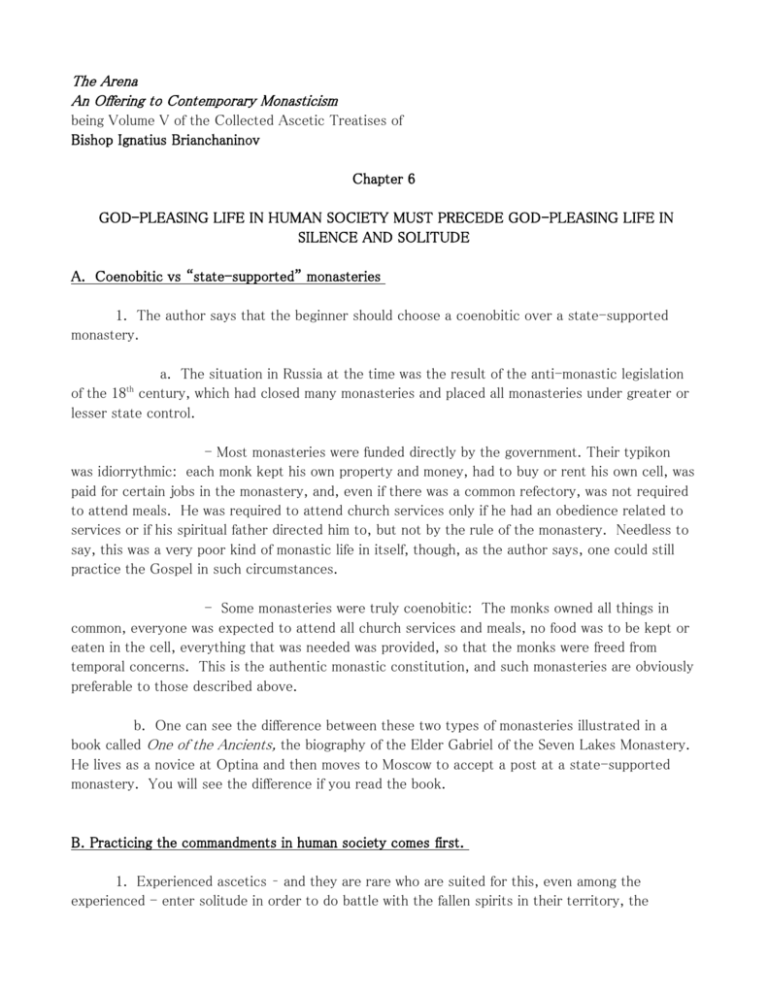
The Arena An Offering to Contemporary Monasticism being Volume V of the Collected Ascetic Treatises of Bishop Ignatius Brianchaninov Chapter 6 GOD-PLEASING LIFE IN HUMAN SOCIETY MUST PRECEDE GOD-PLEASING LIFE IN SILENCE AND SOLITUDE A. Coenobitic vs “state-supported” monasteries 1. The author says that the beginner should choose a coenobitic over a state-supported monastery. a. The situation in Russia at the time was the result of the anti-monastic legislation of the 18 century, which had closed many monasteries and placed all monasteries under greater or lesser state control. th - Most monasteries were funded directly by the government. Their typikon was idiorrythmic: each monk kept his own property and money, had to buy or rent his own cell, was paid for certain jobs in the monastery, and, even if there was a common refectory, was not required to attend meals. He was required to attend church services only if he had an obedience related to services or if his spiritual father directed him to, but not by the rule of the monastery. Needless to say, this was a very poor kind of monastic life in itself, though, as the author says, one could still practice the Gospel in such circumstances. - Some monasteries were truly coenobitic: The monks owned all things in common, everyone was expected to attend all church services and meals, no food was to be kept or eaten in the cell, everything that was needed was provided, so that the monks were freed from temporal concerns. This is the authentic monastic constitution, and such monasteries are obviously preferable to those described above. b. One can see the difference between these two types of monasteries illustrated in a book called One of the Ancients, the biography of the Elder Gabriel of the Seven Lakes Monastery. He lives as a novice at Optina and then moves to Moscow to accept a post at a state-supported monastery. You will see the difference if you read the book. B. Practicing the commandments in human society comes first. 1. Experienced ascetics – and they are rare who are suited for this, even among the experienced - enter solitude in order to do battle with the fallen spirits in their territory, the invisible realm. 2. Someone still under the domination of the passions cannot enter this realm without being deceived and brought under the domination of the demons. 3. Cleansing from the passions can only take place by practicing the commandments of the Gospel in human society. 4. Rejection of the fallen spirits must already be a constant set of one's soul, a fixed direction of his free will, before entering their realm, the invisible universe. 5. The acceptance of fellowship with God, which is a free gift of the Redeemer, is possible only in the context of Church life – the practice of the moral commandments, confession and Holy Communion, etc. It comes, however, not at the beginning of one's conversion (contra the Protestants), but at the end of the stage called praxis, in which the passions are overcome by God's grace working through the ordinary life of the Church . In other words, those who are capable of entering solitude are already in full possession of true sonship and true friendship with Christ; they no longer live by fear of punishment or hope of reward, but are actuated solely by the love of Jesus Christ. This is a very high spiritual state, apart from ecstasy and vision, miracles, etc., which often are the by-products of such a state, but do not necessarily occur. C. Evil spirits easily defeat the unprepared soul. 1. The fulfillment of the commandments in human society gives the ascetic the “clearest and most exact experimental knowledge of fallen human nature and the nature of fallen spirits.” Note that the bishop does not say, “visions of the fallen spirits” or reading about visions of fallen spirits, give one the precise knowledge of the activity of the demons, but rather the practice of the commandments. The one who unremittingly gives himself over to practicing the Gospel will develop spiritual perception of the presence and activity of demons. This is what is needed, not visions. 2. The author reiterates the basic teaching that by the fall man entered into the same moral category as the demons: rejected creatures hostile to God, doomed to burial in the prisons of hell. The ascetic comes to understand the demons by dealing with fallen men, whose struggle with the passions and sins are the clinical laboratory in which the demonic is studied and understood. D. Quote from Ss. Barsanuphius and John 1. Only by enduring slights, annoyances, and humiliations from other people can we be freed from the influence of feelings and sense – i.e. , can rise from a psychological inner life to a spiritual inner life. 2. Our Lord Himself gave us a paradigm for this, for He lived among men and was subject to all these things, before entering into hesychia on the Cross. E. Those who practice the Gospel will succeed. 1. Even if you are in a well-ordered coenobitic monastery, you will fail if you do not study and practice the Gospel. Even if you are in an irregular situation, you can be saved, if you practice the Gospel. 2. We could translate this for our use by saying that one could be in a “good parish” and perish, and one could be in a “bad parish” and be saved. F. The scope for practicing the Gospel is unlimited 1. One could and should study the Gospel all one's life and never cease growing in the practice of it. 2. One of Bishop Ignaty's great one-liners: The most perfect Christians, brought to a state of perfection by divine grace, are imperfect in regard to the commandments of the Gospel.
